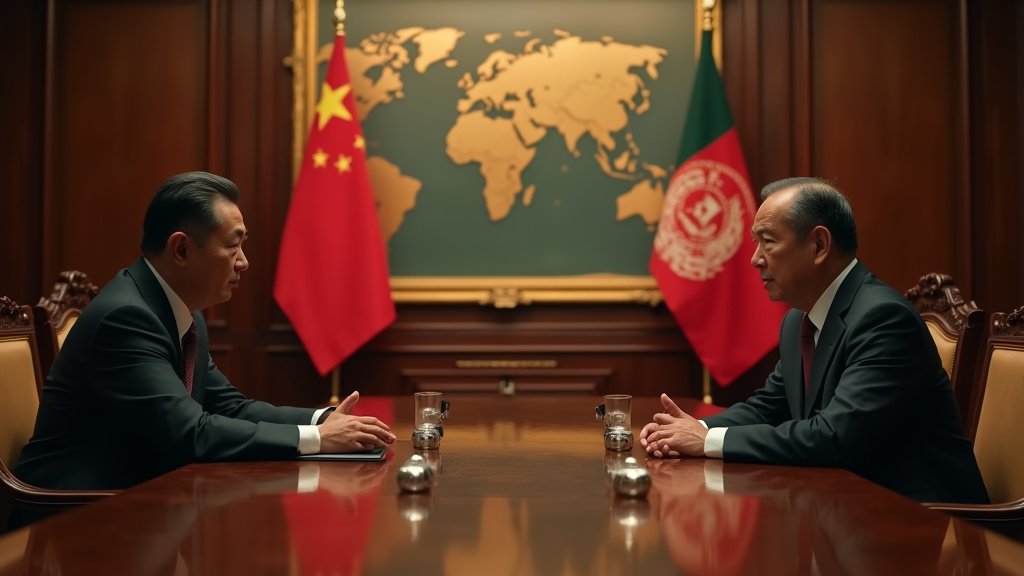KABUL – In a significant development for regional geopolitics and a trending topic in global news, Chinese Foreign Minister Wang Yi recently concluded talks in Kabul with Afghanistan’s acting Foreign Minister, Mawlawi Amir Khan Muttaqi. The discussions underscored China’s intent to deepen cooperation with the Taliban rulers, specifically by exploring Afghanistan’s rich mineral resources and facilitating Kabul’s formal inclusion in Beijing’s ambitious Belt and Road Initiative (BRI). This visit, marking Wang Yi’s second to the Afghan capital since March 2022, signals China’s continued pragmatic engagement with the interim administration, seeking to leverage post-U.S. withdrawal opportunities.
Beijing’s Strategic Calculus: Resources and Connectivity
China’s interests in Afghanistan are multifaceted, driven primarily by economic and security considerations. The impoverished but mineral-rich nation holds vast, largely untapped deposits of lithium, copper, iron, and rare earth minerals—resources crucial for China’s industrial growth and supply chain security. Discussions during Wang Yi’s visit highlighted China’s keenness to begin mining these minerals, particularly the Mes Aynak copper mine and potential new lithium exploration projects.
Beyond resource acquisition, Afghanistan’s strategic location is pivotal to the expansion of China’s Belt and Road Initiative, President Xi Jinping’s signature infrastructure and connectivity project. China aims to extend the BRI westward through Central Asia, leveraging the China-Pakistan Economic Corridor (CPEC) as a key conduit. The Taliban interim government has expressed strong support for BRI integration, viewing it as a vital pathway for infrastructure development, economic revitalization, and access to international markets in the face of widespread international sanctions and frozen financial assets.
Addressing Security Concerns: A Shared Priority
A cornerstone of China’s engagement strategy is its deep-seated security concern regarding potential instability spilling over from Afghanistan, particularly the presence of the East Turkistan Islamic Movement (ETIM). Beijing views ETIM as a separatist threat to its Xinjiang region and has consistently pressed the Taliban to ensure Afghan territory is not used as a base for any terrorist activities against China or its neighbors.
During their meetings, both in March 2022 and more recently, Foreign Minister Muttaqi has reiterated the Taliban’s commitment to address China’s security concerns, assuring Wang Yi that Afghanistan is highly vigilant against the resurgence of terrorism and will take resolute measures to eliminate such forces. This mutual understanding on counter-terrorism forms a critical foundation for the deepening of bilateral relations, aiming to foster regional stability crucial for large-scale investments.
Evolving Diplomatic Landscape and Regional Alignment
While China has not yet formally recognized the Taliban government, its engagement has been notably pragmatic and consistent since the Taliban’s return to power in August 2021. China was among the few countries to keep its embassy open in Kabul and has maintained extensive diplomatic contact. Significant steps towards de facto recognition include China becoming the first country to accept credentials from a Taliban-appointed ambassador in Beijing in January 2024 and appointing its own new ambassador to Kabul in September 2023.
China has also emerged as a prominent advocate for Afghanistan’s reintegration into the international community, urging other nations not to interfere in its internal affairs and to unfreeze Afghan financial assets. This diplomatic stance highlights Beijing’s desire to fill the economic and diplomatic vacuum left by Western powers. The deepening ties are also reflected in increasing bilateral trade, which reached approximately $1 billion, and frequent high-level exchanges.
Furthermore, China is actively promoting trilateral meetings involving Afghanistan and Pakistan, aiming to foster broader regional cooperation, especially concerning security and infrastructure connectivity like the Uzbekistan-Afghanistan-Pakistan railway. This collaborative approach signifies a shift in the news landscape of Central and South Asia, positioning China as a key mediator and economic partner.
The Path Forward: Opportunities and Challenges
The deepening cooperation offers a lifeline to the Taliban regime, which desperately seeks international investment and legitimacy to address Afghanistan’s dire humanitarian and economic challenges. For China, it presents a strategic opportunity to secure vital resources, expand its Belt and Road Initiative, and bolster regional security by addressing potential extremist threats.
However, significant challenges remain, including the persistent security situation, international scrutiny over the Taliban’s human rights record, and the complexities of large-scale infrastructure and mining projects in a volatile environment. Despite these hurdles, China’s determined engagement underscores its long-term vision for Afghanistan’s role in its global economic and geopolitical strategy, signaling a new chapter in the country’s international relations.




